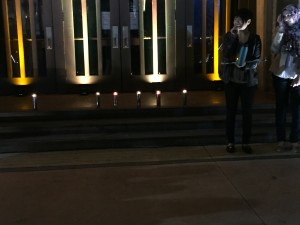I was asked to speak tonight at an interfaith gathering which was a memorial for the fourteen people who were killed in the San Bernardino attack, and a chance to come together as a broad and diverse community to reject Islamophobia.  This is what I said:
This is what I said:
One aspect of the traditional Jewish way of mourning is to recite the so-called Jewish prayer for the dead, the Kaddish. The Kaddish, however, is not actually a prayer for the dead. It is a prayer that glorifies God.
yitgadal ve-yitkadash shmay rabbah. May the name of God be glorified and sanctified. Our tradition tells us that when we say the kaddish, God mourns saying: “They are praising Me, and yet look at my ravaged world.” (Bavli Berachot 3a) God’s tears mingle with our tears. We mourn together. Tonight we mourn the fourteen beautiful souls who were killed in San Bernardino in a horrific act of terrorism. An act that blasphemed the name of God, as all acts of murder do. Unfortunately, we are coming together more and more often to mourn the consequences of terrorist mass killings in the United States. In Charleston, in Colorado, and now in San Bernardino. Continue reading
